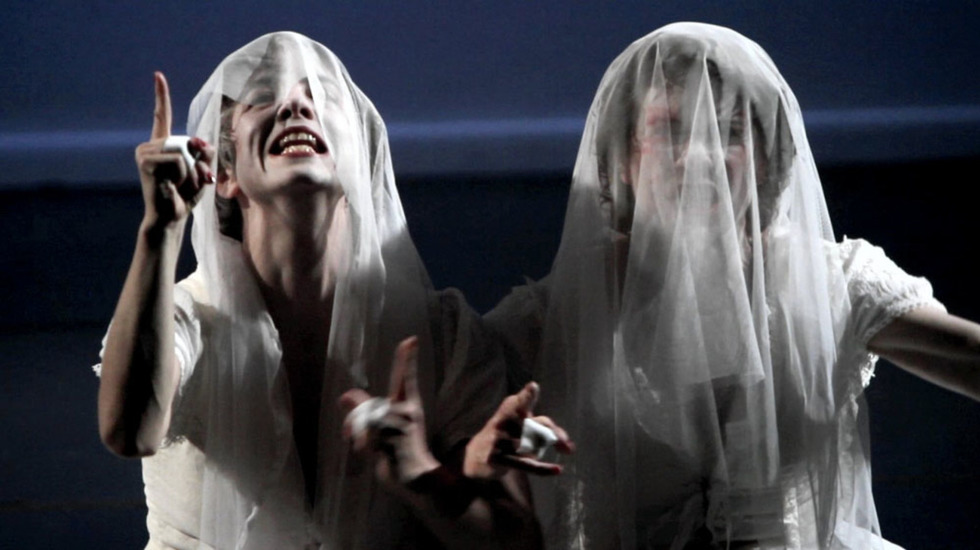
BY ZACHARY WIGON |
Two Films, One Year: A Conversation With Josephine Decker
Indie breakout Josephine Decker on her truly unique rise.

For any filmmaker, having a feature accepted to play the Berlin Film Festival is an enormous honor. To have two features selected for the same festival? It's more or less unprecedented. Yet this was exactly the situation that indie filmmaker Josephine Decker found herself in this past February, when her feature directorial debut, Butter On The Latch, was accepted to the festival alongside her follow-up, Thou Wast Mild And Lovely. An actress, performance artist and musician in addition to filmmaker (Decker has acted for indie stalwart Joe Swanberg a number of times, and Swanberg returned the favor by starring in Mild And Lovely), Decker announced her presence as a filmmaker quite loudly with the dual selection of her work at one of the most esteemed fests in the world.
This Friday, November 14th, both films will see a theatrical release as part of the screening series at the IFP's new Made in NY Media Center, which has a movie theater on the premises. Both films feature confident elliptical storytelling and abstract modes of naturalism that feel like a Malick influence shot through with, at times, horror and high emotional tension. Butter On The Latch revolves around a friendship between two women at a Balkan folk music retreat in California, detailing the frissons and fractures that crop up as the women are placed in an isolated environment; Thou Wast Mild And Lovely deals with a not dissimilar setup, focusing on a hired farmhand who is drawn into a complex and tense relationship with his employer and his employer's daughter. I had the chance to speak with Decker recently about her busy year.
There was a lot of frustration and hard work going back and forth between the two films - it's a little schizophrenic, I don't recommend it!
Tribeca Film: One thing that makes your story so unique, of course, is that you had two features play Berlin simultaneously, and now they're being released simultaneously. How did that happen? It's a wonderful validation of your work.
JD: Well, as a filmmaker, you don't have validation very often, so often you're wondering why. It's ironic because I was making movies for seven years and then all of a sudden this happened. There was a lot of time not being in the limelight, and I'm grateful for that, because I was forced to develop deep spiritual practices that would keep me going through that time. Berlin was like a dream. I will never be able to thank that festival enough, it changed my life. It was a crazy time too, because I already barely slept for a month and a half, and then there's the jet lag, and the press, and the parties, and you're maybe sleeping two or three hours a night. I was so sick by the fifth or sixth day, but it was all in the name of magic. It was exciting. It was also nice, having a little bit of a spiritual grounding for that stuff, because, for example, you don't only get positive reviews, we got some negative reviews at Berlin, and it was so nice to just think, oh, this person didn't connect to the movie, that's a shame. That was kind of as far as it went. Everyone else has their own taste, that's cool. But we were lucky because a lot of the press really enjoyed the film.
This didn't come together this way on purpose. We shot Butter On The Latch a year before, and I was almost done editing it when I went into production on Mild and Lovely, but I wasn't quite finished. There was a lot of frustration and hard work going back and forth between the two films - it's a little schizophrenic, I don't recommend it! But anyway, Berlin invited Butter On The Latch after seeing a rough cut, and they invited it early, so when I finished Mild and Lovely I showed that to them as well, and they loved that one too.
You have to know that your collaborators want you to make the movie that you want. Don't back down because you think it's nice to them.
Tribeca Film: It's funny, I don't know if I've ever heard a filmmaker have such a healthy and balanced reaction to a negative review. How are you able to be so balanced about that?
JD: Well it sort of reminds me of how, when we were finishing Mild and Lovely for Berlin, we weren't able to finish the sound mix before the festival. I was so upset about that. But the sound design we had in Berlin, it didn't sound the way I wanted to. But we just ran out of time. I remember crying a lot and I called David Barker, my editor on the film, and I was talking to him about how upset I was, and then he said, how did you feel about the work you did do in the sound mix? And I told him, the work we had gotten done was amazing. And I realized, I'm going to Berlin, my parents are coming, my friends, the cast and crew - anyway, David helped reframe that moment for me in a beautiful way, I realized how lucky I was. It's easy to get wired down in the problems and forget the hard work you've done. I mean, hundreds of people were seeing the film. So getting a bad review really didn't feel that bad, because there were so many wonderful things happening.
Tribeca Film: You mentioned David Barker, your editor, who is listed as a co-writer on Mild and Lovely as well, which you don't see very often, so it might be interesting to hear about your working relationship with him, as well as the relationships you've had with some of your other key collaborators, like Joe Swanberg - you've acted for him a number of times, and of course he's your star.
JD: All of them taught me a lot. David is very good at keeping the filmmaker in touch with herself while editing. Editing can be really stressful because you're making decisions that define your movie, and it's easy to get tripped up with wanting the film or yourself to be seen in a certain way. Making films is a way of being seen in the world. So it's loaded with a lot of meaning, and sometimes that meaning can cloud the making of the film. David is very good at keeping my vision clear and helping me to stay out of the movie, if you know what I mean - he helps make sure the movie isn't my idea of the movie, but rather, the movie is allowed to be what it wants to be on its own.
Joe was great because first of all, he's a friend, so it's great to work with your friends, but also, when we were on set, early on, it was already a mess, and my DP Ashley and I didn't have any time on location - she arrived on the first shooting day. She came and because we hadn't seen the locations before, we had a lot to talk about, but the whole cast and crew was waiting around. Under normal circumstances we would have already made those decisions. It wasn't going very well. And I went back to my room and I was totally miserable, and Joe walked by at one point, and - Joe had just made Drinking Buddies, which was a huge budget - and I asked him, Joe, how did you make that movie? And he just said, you know, I just pretended like I knew what I was doing, and also, you have to know that your collaborators want you to make the movie that you want. Don't back down because you think it's nice to them. You need to have the film be the way that you want it.
Because I want my art to be a conversation with the audience, I try not to have all the answers set out in my mind.
Tribeca Film: That's great advice.
JD: Yeah, it was helpful, the idea of, get the performance you want, insist on what you want to insist on. You know, everyone wants to be on the same page, and the director is the person holding that page. I talked to Ashley after that, we had a great conversation, and she asked me to be clearer, and I said I would be clearer. And then the film started to sing.
Tribeca Film: There's a kind of elliptical style in the storytelling in both films - certain key pieces of information are very intentionally withheld from the audience, an air of mystery often pervades. What is it about that style that appeals to you?
JD: I love movies I have to keep thinking about. I love not having all the answers after I walk out of the theater. A lot of my favorite films are films I think about a long time after seeing them, and they really affected my personality. When you see a great work of art it enters you and you get to respond and change because of it. Art has done that to me. So because of that, because I want my art to be a conversation with the audience, I try not to have all the answers set out in my mind. While editing the movies I felt a little possessed, I was letting it all flow through me. It all came out very spontaneously, and I think there's something exciting when you don't have full access to what you're doing.
Click to purchase tickets for Butter on the Latch and Thou Wast Mild And Lovely.

